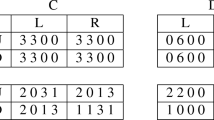Abstract
The folk theorem is extended here to the case where after each stage of the repeated game each player is informed only about the equivalence classes of the pure actions which were used by the other players. The sets of upper equilibrium payoffs and of lower equilibrium payoffs are characterized here, and they are found to be different.
Similar content being viewed by others
References
Abreu D, Pearce D, and Stachetti E (1986) Optimal Cartel Equilibria with Imperfect Monitoring, Journal of Economic Theory (forthcoming)
Aumann RJ (1964) Mixed and Behavior Strategies in Infinite Extensive Games, in Advances in Game Theory, Ann. Math. Studies, 52, Dresher M et al. (eds.). Princeton, N.J.: Princeton University Press, 627–650
Aumann RJ (1976) Lecture Notes in Game Theory, Stanford University
Aumann RJ (1981) Survey of Repeated Games, in Essays in Game Theory and Mathematical Economics in Honor of Oskar Morgenstern, Bibliographishes Institute, Mannheim/Wein/Zurich, 11–92
Breiman L (1968) Probability, Addison-Wesley Publishing Co.
Fudenberg D, Maskin E (1986) Discounted Repeated Games with Unobservable Actions, I: One-Sided Moral Hazard, mimeo
Fudenberg D, Maskin E (1986) Discounted Repeated Games with Unobservable Actions, II: Two-Sided Moral Hazard, mimeo
Green E, Porter R (1984) Noncooperative Collusion Under Imperfect Price Information, Econometrica, 52, 975–994
Hart S (1985) Nonzero-Sum Two-Person Repeated Games with Incomplete Information, Mathematics of Operations Research, 10, 117–153
Kuhn HW (1953) Extensive Games and the Problem of Information, in Contributions to the Theory of Games II, Ann. Math. Studies, 28, Kuhn HW, Tucker AW (eds.), Princeton, N.J.: Princeton University Press, 193–216
Lehrer E (1986) Lower Equilibrium Payoffs in Repeated Games with Non-Observable Actions, International Journal of Game Theory, 18, 57–89
Lehrer E (1986) Two Player Repeated Games with Non-Observable Actions and Observable Payoffs, Center for Research in Mathematical Economics and Game Theory (R. M. 76), The Hebrew University, Jerusalem
Lehrer E (1989) Correlated Equilibria in Two Player Repeated Games with Non-observable Actions, revised version, Northwestern University Working Paper
Radner R (1981) Monitoring Cooperative Agreements in Repeated Principal-Agent Relationship, Econometrica, 49, 1127–1148
Radner R (1986) Repeated Partnership Games with Imperfect Monitoring and No Discounting, Review of Economic Studies, 53 (1), 43–58
Rubinstein A, Yaari M (1983) Repeated Insurance Contracts and Moral Hazard, Journal of Economic Theory, 30, 74–97
Sorin S (1983) Some Results on the Existence of Nash Equilibria for Non-Zero Sum Games with Incomplete Information, International Journal of Game Theory,12 (4), 193–205
Sorin S (1988) Repeated Games with Complete Information, CORE Discussion Paper No. 8822
Author information
Authors and Affiliations
Rights and permissions
About this article
Cite this article
Lehrer, E. Nash equilibria of n-player repeated games with semi-standard information. Int J Game Theory 19, 191–217 (1990). https://doi.org/10.1007/BF01761076
Received:
Revised:
Accepted:
Issue Date:
DOI: https://doi.org/10.1007/BF01761076




